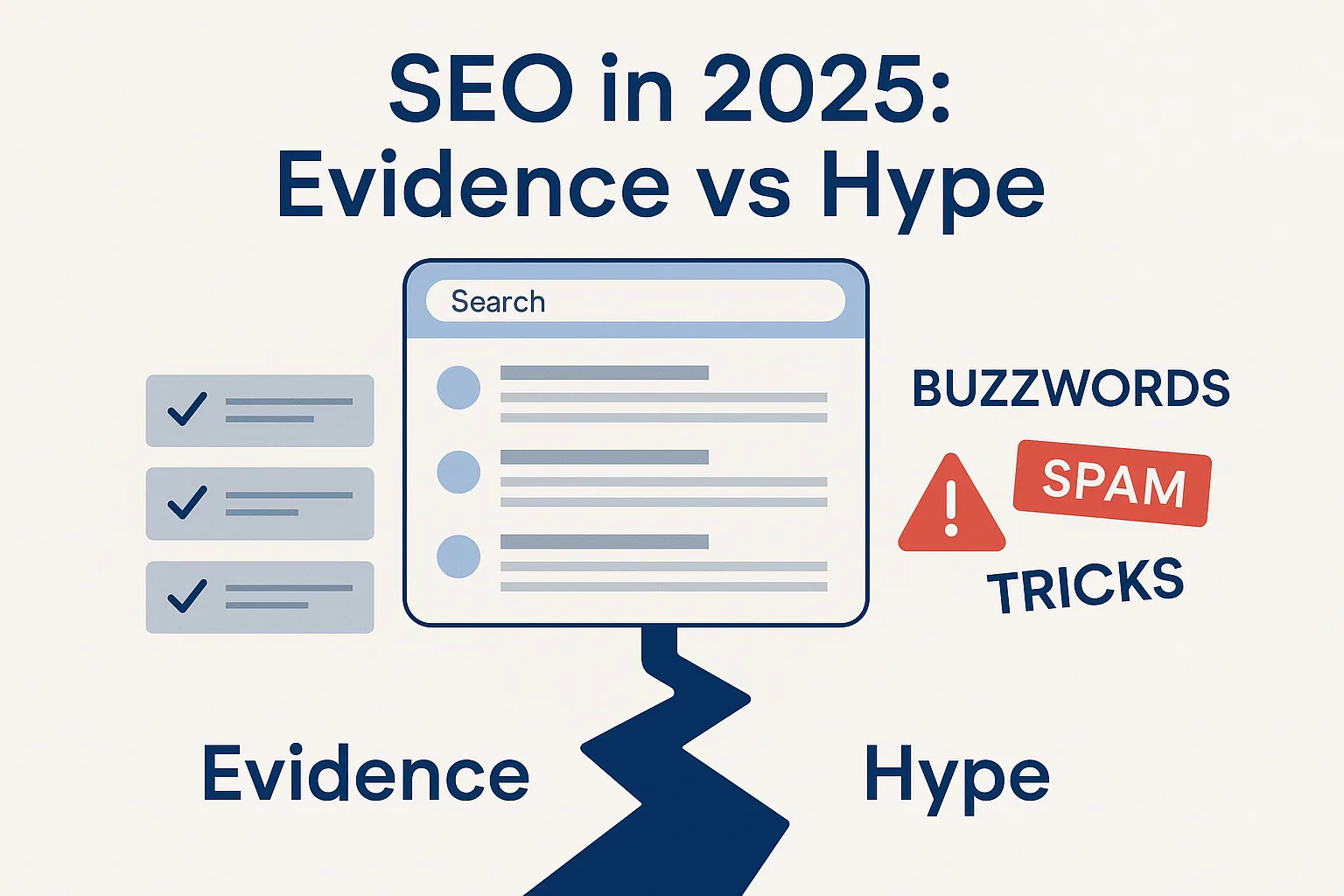📌 TL;DR — What You Need to Know
- Topical authority and E-E-A-T signals now drive SEO rankings more than keyword density ever did
- User engagement metrics matter: Focus on improving CTR, dwell time, and reducing bounce rates for better visibility
- Links still count — but quality and relevance trump raw quantity in 2025
- AI Overviews are reshaping search: Appearing in ~50% of queries, so optimize for featured snippets and conversational queries
- Test systematically using controlled experiments rather than chasing every new tactic
Introduction
SEO has changed more in the past 18 months than in the previous five years. Google's 2024–2025 updates integrated its helpful content system into core rankings, completed mobile-first indexing, and introduced new performance metrics like Interaction to Next Paint (INP).
The result? A clear divide between strategies that deliver and those that are pure hype. This blog highlights what actually works, what's overblown, and what fails in 2025 — with evidence, not speculation.
What actually drives rankings today
1. Content quality and topical authority
The strongest ranking driver is no longer keyword density but comprehensive topical coverage. Surfer SEO's 2025 ranking factors study (1M+ SERPs) shows topical authority is one of the strongest correlates with rankings, while keyword density is effectively irrelevant.
2. E-E-A-T signals
Pages with clear author credentials, citations, and trust indicators consistently perform better. SEMrush found that sites with Experience, Expertise, Authoritativeness, and Trustworthiness were up to 30% more likely to rank. Practitioners like Lily Ray and Marie Haynes have documented measurable lifts following E-E-A-T improvements.
3. User engagement and technical experience
First Page Sage's 2025 ranking factor report shows engagement signals (CTR, dwell time, bounce rates) now carry ~12% weight. Core Web Vitals remain lightweight tie-breakers, but case studies show impact: Yahoo! JAPAN boosted page views by 15% after layout shift fixes.
4. Links, but not like before
Backlinks matter, but raw quantity has declined in influence. First Page Sage estimates links now contribute ~13% of ranking weight, down from 50%+ a decade ago. The focus is on relevance and authority — digital PR and genuine citations outperform link farming (Amsive Digital).
5. Freshness
Freshness is increasingly influential. First Page Sage shows its weight jumped from <1% to ~6%. Controlled tests confirm simple updates like changing "2023" to "2024" in titles can significantly lift CTR (SeaRanks experiments).
Dubious or overstated claims
Emerging patterns to watch
- AI Overviews. Appear in ~50% of queries, cutting clicks by ~34% (Exploding Topics, Search Engine Land). Impact varies by query type.
- User-generated content. Reddit and Quora increasingly rank high, signalling preference for authenticity (WordStream, Amsive Digital).
- Answer Engine Optimisation (AEO). Chunked content answering specific questions performs better in AI search (SEO for Google News).
- Controlled SEO experimentation. SearchPilot reports ~20% average gains from statistically valid tests.
- Generative Engine Optimisation (GEO). Academic frameworks are emerging: Sept 2025 paper and Aug 2025 study.
Buzzwords to treat with caution
- "AI SEO optimisation." Often rebranded basics (Search Engine Land).
- "Programmatic SEO." Legit when high-value, but risky when scaled thin (Google spam policies).
- "Authority building packages." DA/DR boosts are irrelevant (Google clarification).
- "Core Web Vitals = top rankings." CWV are tie-breakers, not magic bullets (Google CWV docs).
- "Schema guarantees rankings." Helps eligibility, not rank (Google Developers).
- "E-E-A-T as algorithm." Still assessed through proxies, not a direct factor (SEMrush).
What doesn't work
Navigating SEO in an AI-driven search world
SEO in 2025 requires balancing technical foundations with evidence-led content strategies:
- Prioritise user value. Original research and unique insights consistently outperform thin optimisation. The Google API leak exposed "OriginalContentScore" as a ranking factor.
- Get the basics right. Mobile-first indexing is complete (Google Search Central), and Core Web Vitals are prerequisites (Google CWV docs).
- Test systematically. Controlled SEO experiments are delivering measurable gains (SearchPilot 2025).
- Adapt for AI-driven discovery. With AI Overviews present in ~50% of searches (Search Engine Land), content must perform across traditional SERPs, AI summaries, and multi-channel contexts.
Takeaway:
While algorithms evolve, the most reliable path to visibility remains the same — create content of genuine value, and prove it.

